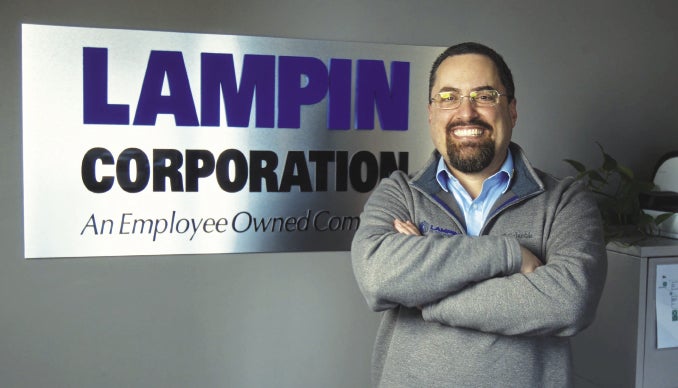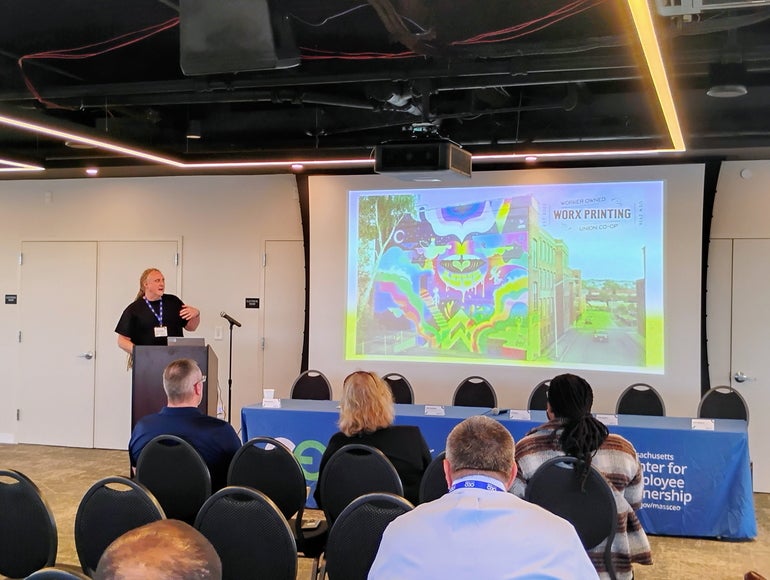Employee ownership can help democratize workplaces and provide a path for owners looking to transition to retirement, according to leaders of employee-owned businesses in Central Massachusetts.
Gathering at an event held by the Massachusetts Center for Employee Ownership at Downtown Worcester’s Glass Tower building on Tuesday, leaders from employee-owned businesses like Worx Printing in Worcester, Burkart Flutes & Piccolos in Shirley, and Lampin Corp. in Uxbridge discussed the financial and workplace benefits of employee ownership.
Employee ownership is a broad concept involving any arrangement where employees own shares in their company or the right to the value of shares in their company, including models like employee stock ownership plans, worker cooperatives, and employee ownership trusts.
Kevin O’Brien, founder and general manager of Worx Printing, became engaged with the idea of worker-owned businesses after he was brought in to help with Sweat X, a Los Angeles-based cooperative apparel company started by Ben & Jerry’s co-founder Ben Cohen, meant to push back against the proliferation of sweatshop-produced clothing.
While Sweat X ended up faltering, the experience led O’Brien to create Worx, which has been operating in Worcester since 2002.
“I felt like I was in Oz,” O’Brien said of his time with Sweat X, “I finally got to meet the wizard, and all I learned was, running a business is really hard, and sadly, it didn’t work. It was really devastating for me, but I promised myself that I would bring this model back to my home city of Worcester.”
O’Brien noted that the support network for employee-owned businesses has grown since then.
“There’s a huge support network here for you all,” he said. “If you’re interested in converting your company, and I’d say I’m agnostic too on what direction of [employee ownership] you go in, I’d be happy to talk to anyone and everyone about the benefits of it being more of a cooperative [model].”
While just 300 or so of the over 722,000 business entities in Massachusetts are employee-owned, Kevin Kuros, interim director of the state-run Massachusetts Center for Employee Ownership, said those who are involved with employee-owned firms are enthusiastic about their experiences.
“What I’ve learned since I’ve been involved in this space is that almost everyone I’ve met who works for an employee or worker owned company is part employee and part evangelist,” Kuros said. “Literally every person I’ve ever met who works for an employee owned business is more than happy and actually goes out of their way to talk to you about their business and what the culture has meant to them, and how enabling and empowering it’s been for their employees.”
A 2017 study conducted by National Center for Employee Ownership found being in an ESOP was associated with 92% higher median household net wealth, 33% higher median income from wages, and 53% longer median job tenure, according to NCEO’s website.
In addition to having the ability to make employees feel empowered, there are also financial benefits to starting an employee-owned business or converting an existing business into employee ownership, including tax benefits, incentives, and loan programs.
Ili Spahiu, deputy district director of Massachusetts for the Small Business Administration, highlighted how existing programs can help owners who are heading to retirement ensure their business lives on.
“The silver tsunami is real,” Spahiu said, referencing the growing number of American business owners and employees who are at or nearing retirement age. “We have a number of businesses that close their doors because they cannot find a suitable buyer.”
Loans from the SBA are available to help businesses convert into employee ownership models.

John Biagioni, president of Lampin Corp. and the winner of the Manufacturing Champion – Small Company award as part of the 2025 WBJ Manufacturing Excellence Awards, said employee ownership is a great way to retain employees and build a strong workplace culture.
“It’s a great way to keep people connected and also feel like they have control,” he said. “Plain and simple, everything I do is for the benefit of the employee.”
Lillian Burkart founded Burkart Flutes & Piccolos in 1983 in her Brookline apartment, with one manual lathe and one manual drill press. The business has grown significantly since then, and is now based in the Phoenix Park mill building in Shirley.
When Burkart began thinking about an exit strategy from the business around 2020, acquisition options which would see the business live on in Massachusetts were virtually nonexistent, leading her to pursue an ESOP model which would see her retain 40% of ownership for the time being.
She highlighted the benefits of that model, which she said ranged from improvements from workplace culture to tax relief.
“I can’t say enough about how exciting it is to come to work every day, to work with people, and to hear them purporting the greatness and the opportunities of ESOPs,” Burkart said.
CLARIFICATION: An earlier version of this article stated there are over 100,000 businesses in Massachusetts. More precisely, there were 722,819 small business entities in the state as of 2024, according to the Small Business Administration.
Eric Casey is the managing editor at Worcester Business Journal, who primarily covers the manufacturing and real estate industries.

